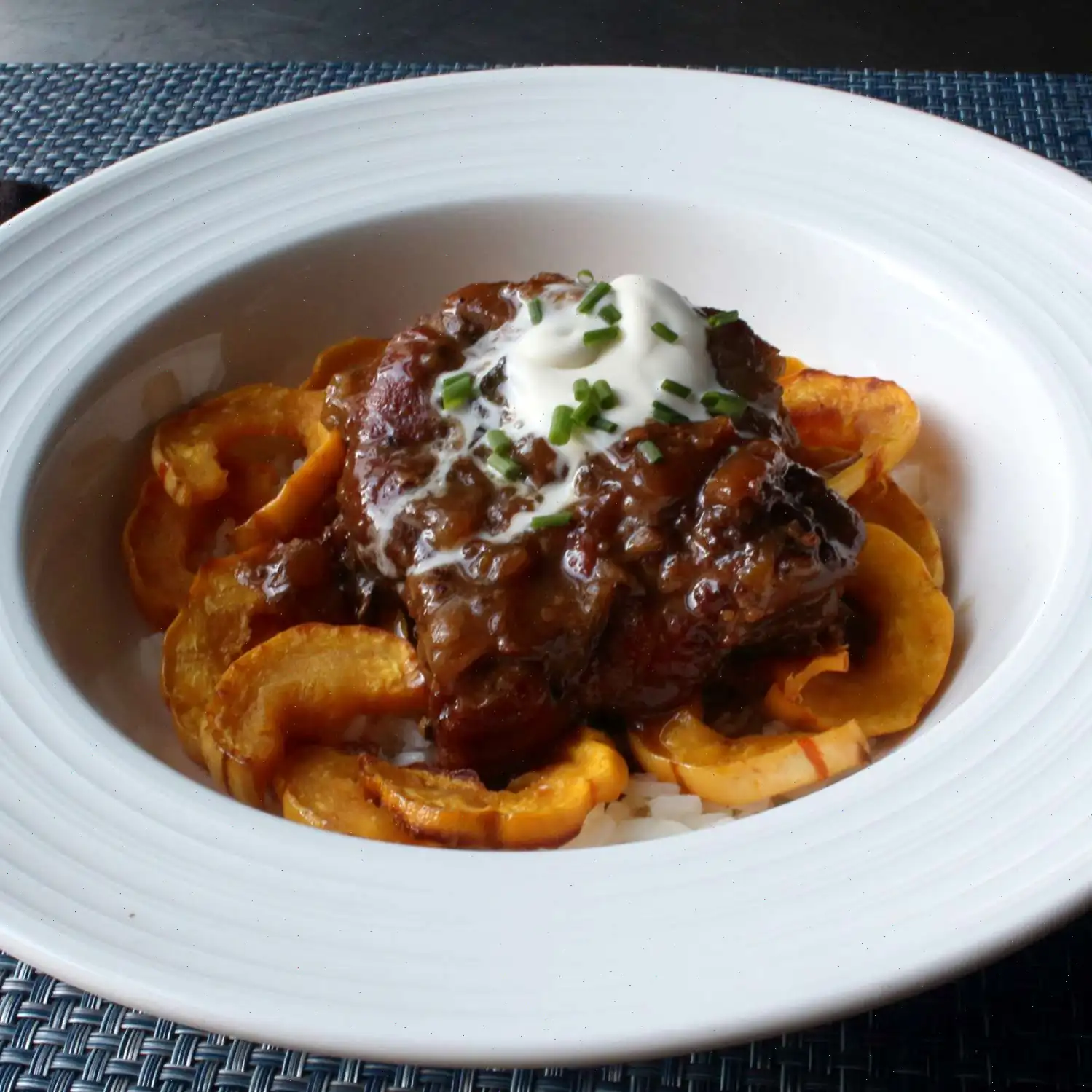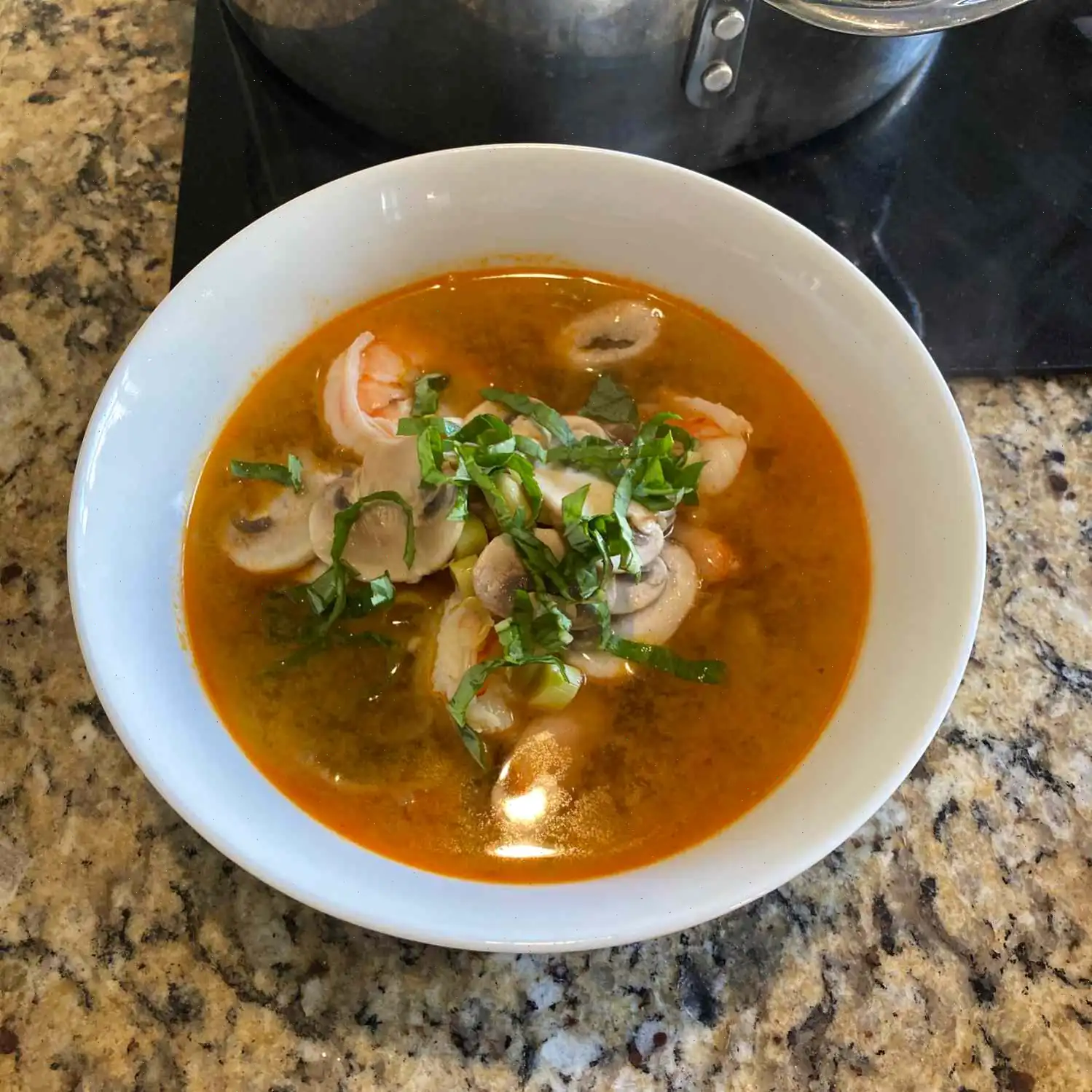
Cider-Braised Pork Shoulder
Ingredients
- 1 (3-pound) pork shoulder roast, cut into 3- or 4-inch chunks
- Kosher salt to generously season pork
- 1 tablespoon vegetable oil
- 1 large onion, chopped
- 1 teaspoon salt, plus more to taste
- teaspoon freshly ground black pepper
- cup fresh sage leaves, torn
- 1 (750 milliliter) bottle hard apple cider
- cup apple cider vinegar
- cup creme fraiche or heavy cream
- 1 pinch cayenne pepper
- Creme fraiche for garnish
- Chopped fresh chives for garnish
Directions
Step 1: Generously salt all sides of the pork shoulder chunks.
Step 2: Heat the vegetable oil in a heavy pot over high heat. Brown the pork shoulder pieces on all sides until the surface is seared and crusty, about 3 to 4 minutes per side. Once browned, transfer the pork to a plate.
Step 3: Add the chopped onions to the pot, reduce heat to medium, and season with a pinch of salt and pepper. Cook and stir for about 2 minutes until the onions begin to soften.
Step 4: Add the torn sage leaves to the onions and continue cooking, stirring frequently, until the onions soften further and begin to brown.
Step 5: Pour in the hard apple cider to deglaze the bottom of the pot, stirring to lift any flavorful bits stuck to the bottom. Raise the heat to high and bring the mixture to a boil.
Step 6: Stir in the apple cider vinegar, then reduce the heat to low.
Step 7: Return the browned pork shoulder chunks to the pot with the cider mixture. Cover and simmer gently over low heat for 1 hour.
Step 8: After 1 hour, remove the lid and flip the pork pieces over. Cover again and continue simmering on low for an additional 1 to 2 hours, or until the meat is fork-tender.
Step 9: Using a slotted spoon, transfer the pork to a bowl. Increase the heat to high and bring the sauce to a simmer.
Step 10: Whisk in the creme fraiche, and simmer the sauce for 8 to 10 minutes until it has reduced by half and thickened slightly. Stir in a pinch of cayenne pepper.
Step 11: Return the pork to the pot with the sauce. Reduce heat to low, and baste the pork with the sauce while it heats through. Continue cooking for about 15 minutes, or until the pork is perfectly tender and the sauce has thickened to your desired consistency.
Recipe Tip
You can substitute non-alcoholic apple cider or apple juice for the hard apple cider, but hard cider works best for the full flavor.
Nutrition Facts (per serving)
- Calories: 696
- Total Fat: 47g (60% DV)
- Saturated Fat: 20g (99% DV)
- Cholesterol: 177mg (59% DV)
- Sodium: 1671mg (73% DV)
- Total Carbohydrate: 17g (6% DV)
- Dietary Fiber: 1g (3% DV)
- Total Sugars: 14g
- Protein: 36g (73% DV)
- Vitamin C: 4mg (4% DV)
- Calcium: 60mg (5% DV)
- Iron: 2mg (12% DV)
- Potassium: 573mg (12% DV)

Chef: John Mitzewich
Origin: United States
Cooking time: 145 minutes
Yield: 4 servings
History and Origin
The tradition of braising pork in cider has its roots in the cider-producing regions of Europe, especially in the United Kingdom and France, where the abundance of apple orchards meant that cider was frequently used in cooking. Cider-braising pork, however, truly gained prominence in American kitchens, particularly in the Northeast, where hard apple cider is commonly made. This dish combines the rich, savory flavors of slow-cooked pork with the tart, fruity notes of cider, creating a uniquely American comfort food that celebrates local produce, particularly apples.
Regional Variations
While the cider-braised pork shoulder recipe is often associated with New England, variations of the dish can be found throughout different parts of the United States, particularly in areas known for apple orchards. In some versions, the cider is mixed with other liquids such as stock, vinegar, or beer to enhance the depth of flavor. Certain regions may add additional herbs like thyme, rosemary, or even cinnamon, reflecting local tastes and available ingredients. The dish also pairs well with a variety of sides, from roasted vegetables to creamy mashed potatoes, depending on the region.
Difference from Similar Dishes
What sets cider-braised pork shoulder apart from other braised pork recipes, such as those braised in wine or broth, is the use of hard apple cider as the braising liquid. This imparts a natural sweetness and tartness to the dish that complements the rich, fatty pork. Compared to wine-braised pork, which tends to have deeper, more complex flavors, cider adds a lighter, fruitier profile. The use of apple cider vinegar in the recipe also adds a tangy sharpness that cuts through the richness of the pork, creating a perfect balance.
Where It's Typically Served
Cider-braised pork shoulder is often served at cozy family gatherings, particularly during the colder months. Its rich, hearty nature makes it a favorite for special occasions and Sunday dinners. In restaurants, it's commonly found on menus that emphasize farm-to-table or seasonal ingredients, as the dish highlights the flavors of autumn. It's especially popular in New England and other apple-growing regions, where the dish is often paired with locally made cider. Some restaurants may even serve it with sides like spaetzle, roasted potatoes, or braised greens to further complement the flavors of the braised pork.
Fun Facts
- The combination of pork and apples dates back centuries, with apples often used to balance the richness of the pork.
- The term "braise" comes from the French word "braiser," meaning to cook slowly in a closed container. The technique is ideal for tougher cuts of meat like pork shoulder, as it helps tenderize the meat while infusing it with flavor.
- In regions where apples are abundant, cider-braising meats like pork and chicken is a common practice. The hard cider helps to tenderize the meat while imparting its signature sweet and tangy flavor.
- Some recipes for cider-braised pork shoulder even incorporate fruits like pears or apples, enhancing the natural sweetness of the cider and complementing the savory pork.
- The dish pairs wonderfully with hard cider or apple-based cocktails, making it a fantastic choice for gatherings or celebrations during apple harvest season.
Conclusion
Cider-braised pork shoulder is a comforting and flavorful dish that highlights the versatility of apples in savory cooking. Its simple preparation, rich flavors, and tender meat make it a perfect meal for autumn and winter evenings. Whether you're enjoying it at home or serving it at a dinner party, this dish is sure to impress with its unique combination of cider, herbs, and slow-braised pork.
FAQ about Cider-Braised Pork Shoulder
Comments
Robert Lee
01/15/2025 01:56:20 AM
I cooked a pork shoulder in the InstantPot using the Meat Button setting for 36 minutes. I used around 4 lbs of cubed meat from a 6 lb bone-in pork shoulder. Since I didn't have apple cider or juice, I used lemonade with added apple and a touch of honey, and it turned out amazing! I served it with BBQ sauce to enhance the flavors of the dish and it was a hit, despite not having all the original ingredients on hand.
Samuel Davis
06/27/2023 01:41:33 PM
Rewritten review: This dish was absolutely fantastic! Despite not following the recipe exactly, I decided to add some rosemary and thyme in addition to the sage, and a splash of chicken stock for extra moisture due to the high altitude (close to 9000 ft). I accidentally used only 2 tablespoons of cider vinegar instead of the specified amount, but hey, we all make mistakes, right? I'm curious to experiment with Guinness and a bit of brown sugar next time. In any case, my husband was blown away and claimed it was "probably the best meal I've ever made him", and we've been married for over fifteen years!
Heather Turner
07/24/2024 01:05:26 PM
I substituted deer shoulder for pork in this recipe and the cider did an excellent job of mellowing out the wild game flavor. I cooked it for 2.5 hours and it turned out very tender.
Joseph Robinson
11/24/2024 04:20:37 AM
Review: I was absolutely blown away by how tender the pork was and the incredible flavor of the sauce. The pairing of pork and apple is just divine. I decided to enhance the sauce by adding a bit of flour to the sautéed onions, which really helped to thicken it up. To top it off, I served it on Chef John's spaetzle, a dish that has now become a beloved staple in our household, especially with my kids who always ask for it.
Sharon Martinez
01/01/2025 12:22:25 AM
Followed the instructions exactly. Impressed! This dish is both uniquely flavorful and savory! I opted for one bottle of Angry Orchard hard cider. Another fantastic recipe from Chef John.
Nancy Hill
12/10/2024 06:46:15 AM
I came across this recipe in the Autumn issue of All Recipes magazine and my excitement grew when I saw it was created by Chef John. I watched his video demonstration and found it so helpful. Although I had everything except for the Hard Cider, which I purchased, I had to substitute heavy whipping cream for creme fraiche. I'll definitely try the fraiche next time! While my husband suggested reducing some of the fat content, I believe it was still quite delicious. Thank you for the great recipe!
Nancy Anderson
08/10/2022 09:40:56 AM
I will definitely be making this recipe again. Those who have the patience to wait for the final reduction step will be delighted with a beautifully complex mix of flavors - each ingredient shines through. A big thank you to Chef John for this fantastic dish!
Emily Clark
12/12/2022 12:36:37 AM
Rewritten review: I had almost forgotten about it, but the meat turned out incredibly tender. My husband absolutely enjoyed it. It's a very rich dish, so I decided to serve it over boiled potatoes. The taste was divine. I prepared this dish twice - once with fresh sage and the second time, I used dry herbes de provence since I had run out of sage. It turned out great both times. This recipe is definitely going to be a regular in our meal rotation. Pork is budget-friendly, especially when on sale, and this dish is very simple to make.








